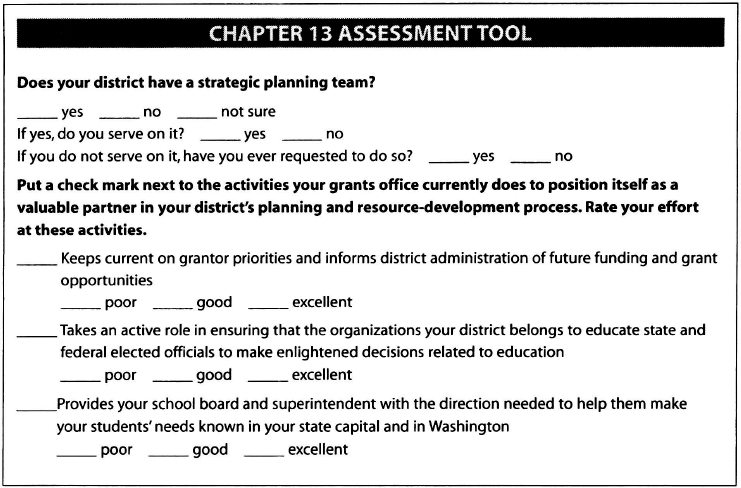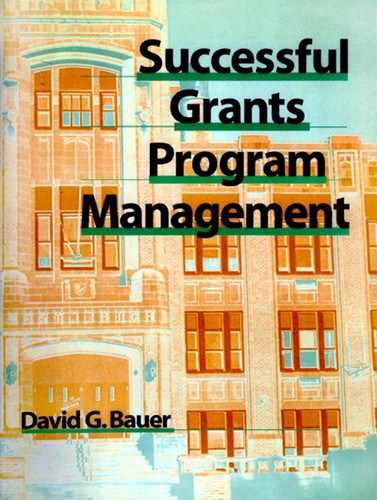Chapter 13
Supporting Planning and Resource Development
IN ADDITION to supporting a proactive grants system with a focus on locating grants for education programs and projects, your district grants office can provide valuable assistance in districtwide long-range and strategic planning. As most plans require new or expanded funding in addition to the reallocation of current district resources, who would be more valuable than the district grants administrator as a member of the strategic planning team?
Planning
The grants administrator who heads a reactive grants system is seldom asked to participate in such a proactive activity as planning for the future. Failure to involve the grants administrator in the district's planning function results in using district funds for programs, buildings, and equipment that could and should have been procured through grants. By supporting new and creative programs with district funds, the grants office is often left with the responsibility of locating support for programs and projects that are extremely difficult to fund through the grants mechanism.
In these instances, the grants office's order of involvement in the planning process should be changed from last to first. By having an early and active role in the planning function, the grants administrator can help the district develop strategies that capitalize on the opportunities provided by the grants marketplace.
For example, it would be much better for a district to expend a small amount of money on a needs-assessment project to help create a credible grant-winning federal proposal than to expend a small amount of money on a large problem that results in little or no change. This is the kind of insight the district grants administrator can provide to the strategic planning team. But to do so, the administrator must keep up with changes in grantor priorities and demonstrate leadership in changing the system. In addition, the grants office must be viewed as a potent and dynamic force in funding educational advancement.
Influencing Legislation
To have an impact on the current crisis in education, more grant programs need to be created and more funds must be appropriated at both the state and national levels. Realizing this, it may be difficult for your grants office to stay away from influencing legislation. You must, however, because you have probably signed assurances that federal grant funds will not be utilized to lobby for more grant funds and because your nonprofit status makes it illegal for you to lobby. But your grants office can take an active role in making sure that the educational organizations your district belongs to continue to educate state and federal elected officials to make enlightened decisions related to education. In addition, it can provide your school board and superintendent with the leadership and direction needed to help them make your students' needs known in your state capital and in Washington.
The district grants office is the logical place to keep information on elected officials that may be needed to help others make their opinions and support known. This information should include linkages, committee assignments, addresses, phone numbers, and so on.
It is important that you make elected officials understand that they should work to create grant funds that all schools can apply for. You do not want them to encourage a grant to your district that is not based on competition and peer review. Specifically, you do not want an elected official to place a clause or restriction on a noneducation bill that mandates an education grant to your district if it is passed. This is referred to as earmarking federal legislation, and it is not held in high esteem in the grants marketplace.
Earmarking has been on the increase in recent years, but it should be avoided just as lobbying should be. Earmarking public funds (state or federal) brings discredit to the grants system and can result in a negative reaction from other districts. In addition, federal bureaucrats do not like to handle earmarked grant funds because the proposal (which is not even written at the time the bill is passed) is not required to compete with other proposals. Peer review has no effect, and thus a political grants decision, not a professional decision by experts in the field, will be made.
This type of irresponsible behavior subverts the purpose of peer-reviewed competitive grantseeking and reduces the grants process to a contest of political strength. Many institutions of higher education have developed a written policy that requires the return or refusal of any grant funds made available through earmarking. Only time will tell how elementary and secondary educational institutions will fare. Ethics are easy to support until resources shrink and needs become critical.
Your district grants office should censure earmarking for ethical reasons and also because there would be no need for your office if earmarking was the grantseeking method of choice. There would only be a need for an office of political influence.
A booklet aimed at educating district leaders may help you expand your office's traditional role. This document could take the form of a position paper or even a proposal to position the grants office as a vital component of your district's planning and resource-development process.

